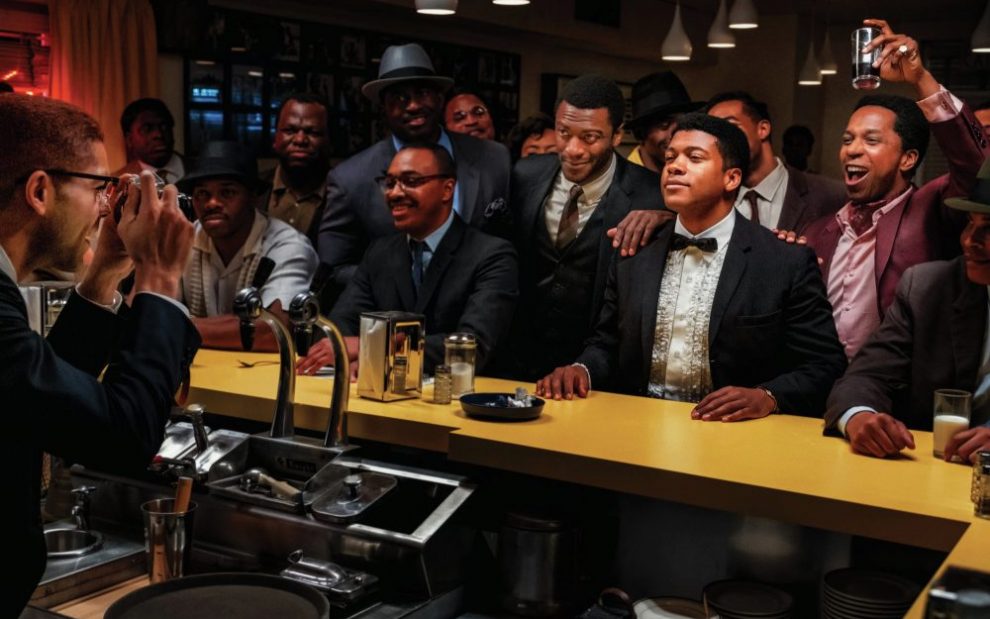For the past 21 years, I’ve taught at historically Black colleges, and several times during those years the theater department has either hosted or produced a 1987 play called The Meeting by Jeff Stetson. It depicts a fictional encounter between Martin Luther King Jr. and Malcolm X. The appeal for college drama is obvious. Two men, representing the historic nationalist and integrationist streams in Black politics, meet in a hotel room, argue about religion and ethics for an hour, and then go their separate ways. Small cast, one set, big ideas—what’s not to like?
I’d bet that writer Kemp Powers saw The Meeting when he was a student at Howard University. But he was reading a biography on Muhammad Ali when he stumbled upon the real-life “meeting” that inspired One Night in Miami. On February 25, 1964, after the young boxer still called Cassius Clay won the world heavyweight championship, he went back to his hotel to hang out with his friends—Malcolm X, NFL star Jim Brown, and pop music superstar Sam Cooke. You couldn’t make that up. It really happened. There are pictures. However, Powers couldn’t find any information about what went on with the four men in the room, so, like the author of The Meeting, he made it up.
One Night in Miami is now streaming on Amazon Prime Video. It is written by Powers and directed by Regina King. And, in the course of its imagined meeting, it gives us a stirring debate about the value and burden of celebrity, the tension between individual autonomy and social responsibility, and, at least in the case of Clay and Malcolm X, the battle between faith and fear.
In February 1964 these four princes of African America are all at the top of their respective games. Clay is the new champ, Cooke has started his own record company, Brown has just set the NFL season rushing record, and Malcolm X, as spokesperson for the Black separatist Nation of Islam, is the African American leader that white America most loves to hate.
Brown, Clay, and Cooke are all, in their very different ways, artists. They are each supremely skilled at a craft they love and have perfected through years of hard work, and they have grown into confident men who want to control their own destinies. Malcolm X, however, wants them to see their individual destinies as inseparable from the collective quest of an oppressed people.
He comes down especially hard on Cooke, who, he says, is pandering to a white audience instead of using his music to deliver the message of Black freedom. It’s an argument that artists and revolutionaries have been having since the dawn of time but not one we’re used to hearing in Hollywood movies. Meanwhile, Cooke insists that he is serving the cause by owning a company that allows Black singers and songwriters to profit justly from their creations.
Brown, Clay, and Cooke are all, in their very different ways, artists.
Brown also insists that economic power, through Black-owned businesses, is the key to Black power. This is a position the still-living Brown maintains to this day, and it led him to endorse Richard Nixon in 1968 and Donald Trump in 2020. Malcolm X, meanwhile, pushed the Black capitalism strategy as a member of the Nation of Islam, but in the last year of his life seemed to be moving past it.
Anyway, money isn’t mainly what’s on Malcolm X’s mind. To him the other three men are friends whom he admires and respects, but, as an activist, he also pushes them to use their fame and influence for a larger purpose. At one point Malcolm X tells the others that they are Black America’s strongest weapons for freedom. Brown looks him straight in the eye and replies “We are not anyone’s weapons, Malcolm.”
Cooke started his career as a gospel singer, but by 1964 he is living the fast life of a pop star. Brown is frankly irreligious and would later be accused of downright predatory behavior toward women. Malcolm X and Clay-turned-Ali, however, are shown to be men of genuine faith. We see Clay joining Malcolm X for Muslim prayer before his championship bout, and we see Clay struggling with the sins of the flesh that he’ll have to forgo as a Muslim. He also knows that public condemnation awaits him when he announces his conversion. Malcolm X, however, has recently learned of pervasive corruption at the very top of the Nation of Islam and is secretly laying plans to leave it and establish his own African American Muslim organization.
In the closing minutes, we see Clay go bravely before the media, with Malcolm X at his side, and announce his conversion. We also see Malcolm X, back home in New York, rushing his wife and daughters out of their house that has been firebombed, presumably by members of the Nation of Islam.
Throughout the film, Malcolm X badgers Cooke about his failure to write songs for the freedom struggle. Later in 1964, Cooke did release “A Change Is Gonna Come,” a timeless anthem of longing for freedom and dignity. The film ends with Cooke, played by Leslie Odom Jr. of Hamilton fame, singing it on The Tonight Show.
At one point Malcolm X tells the others that they are Black America’s strongest weapons for freedom. Brown looks him straight in the eye and replies “We are not anyone’s weapons, Malcolm.”
Still, while Cooke wrote a really, really good song for the movement, Malcolm X and Clay/Ali would go on to present real challenges to America’s Cold War empire. At the time of his death in 1965, Malcolm X was marshalling support from Third World governments in the United Nations to have the United States condemned for its human rights violations against African Americans. A couple of years later, Ali sacrificed his career by refusing conscription into the U.S. war on Vietnam.
In the end, it was the men of faith who really shook things up.
This article also appears in the May 2021 issue of U.S. Catholic (Vol. 86, No. 5, pages 36-37). Click here to subscribe to the magazine.
Image: Courtesy of Amazon Studios














Add comment